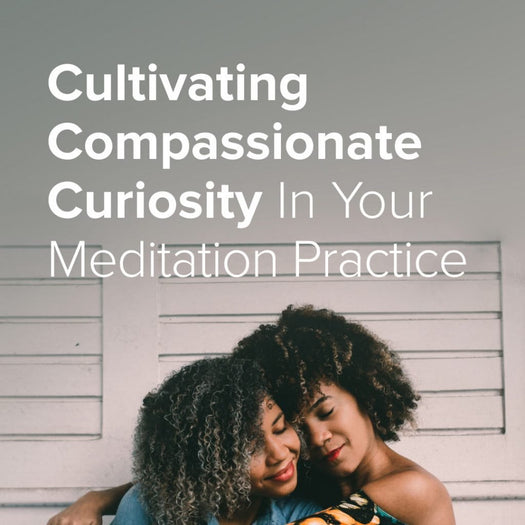Cultivating Compassionate Curiosity In Your Meditation Practice

Chrissy is an inspiring yoga and meditation instructor, writer, and artist. Her meditations are approachable and full of heartfelt wisdom. Read as she shares her perspective on cultivating compassion and curiosity during your meditation practice.
Meditation can be an insightful and transformative practice. It can teach us so much about our patterns, but let’s face it—it’s not always easy to sit with our experience and tolerate what we observe.
The truth is: Meditation is hard. Regardless of whether you’re new to the practice or you’ve been meditating for years, it’s likely you’re already well aware of this truth.
Facing our thoughts, but also the automatic and non- stop chatter about our thoughts is no picnic. We may feel quickly bored or overwhelmed by our experience. It can be challenging to simply sit with the present moment and not judge it or want to change it in some way—to make it better, less awkward, or less painful.
Heck, sometimes it feels easier to avoid the whole thing altogether.

Here’s some good news: You’re totally normal.
If you have a mind, it’s going to label and judge your experience. The mind likes what it knows and does the following:
- A thought arises and is immediately classified based on your prior history with that particular thought.
- The mind then catalogues the thought by its significance to your perspective.
- Once a specific meaning has been identified, the mind spins the thought into a story inspired by its assumed relationship to your overall sense of self.
This largely unconscious process of labelling, judging, and reactive storytelling keeps us trapped in our habitual patterns of thinking. More importantly, it can keep us stuck in our conditioned assumptions, both about the present moment but also about ourselves.
When considering judgement, it’s important to keep in mind that a lot of our mental chatter isn’t grounded in reality.
Many of the stories we tell ourselves simply aren’t true. Our thoughts—and the stories we weave with and about them—may reflect what we’ve come to understand about ourselves through our life experiences. They may flow from fear, desire, or straight up misunderstanding.
Therefore, when we judge our experience it’s possible our judgements are actually way off base. They may inadvertently perpetuate our false understanding of who we are.
If we can learn instead to tolerate our judging mind and stay with our experience long enough to look around and get curious, we begin to uncover the why behind our patterns.
“Mental chatter may flow from fear, desire, or straight up misunderstanding.”

Curiosity is an invaluable tool for diffusing judgement in our meditation practice.
Better yet, it’s a tool we can cultivate. Curiosity is an attitude of wonder that inspires us to observe our experience from a different perspective. When we approach our practice with a beginner’s mind, we give ourselves the opportunity to see our experience with fresh eyes.
Think of it this way: Curiosity is like shopping at a store with a great return policy—“Take it home! Try it out! If you don’t like it, bring it back for a FULL refund!” Approaching our practice with an inquisitive, even playful attitude lowers the stakes by relaxing our attachment to our beliefs. It empowers us to try different ways of seeing and relating to our experience.
We can practice compassionate curiosity in real-time when we catch ourselves stuck in judgement during meditation. We can also cultivate curiosity when we look back on our experience in meditation after our practice is finished. Start by asking yourself some simple questions.
For example:
“Why did I jump to that conclusion about my experience?”
Or, “What’s the significance of this story I’m telling myself? What does it mean to me?”
Another great question is: “Is this thought or story even true?”
Answering these questions gives us a chance to look honestly at our patterns and poke holes in our assumptions.

Curiosity helps us practice meditation in a way that welcomes the totality of our experience. It invites us into the heart of the practice, which is to allow things to be as they are.
To that end, being with our judgements and giving them space in our mind is maybe the key to learning more about why they’re there in the first place. If we push our judgements away, or worse, judge ourselves for having them, we may miss the opportunity to uncover what they can teach us about who we are.
Integrate Compassion In Your Practice With Muse
Listen to Chrissy Carter’s “Cultivating Compassion” in the Compassion collection on the Muse app. Here you’ll find a number of heartfelt-guided meditations that focus on loving-kindness, healing a heart, forgiveness and unconditional love. The styles for these guided meditations are primarily heart and inspiration.
